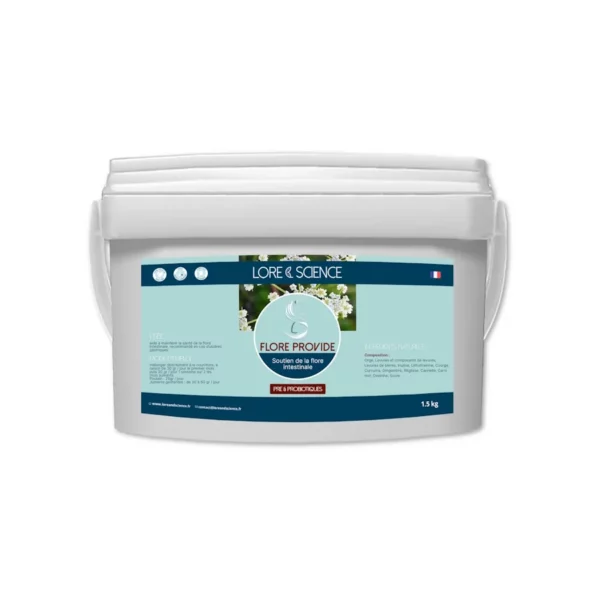Like many warm-blooded mammals, horses' temperature can rise as their immune system fights infection and/or disease. Equine fever can be a symptom of a wide range of illnesses. So it's vital to know how to detect the signs of fever in horses, and how to take their temperature correctly. Causes of equine fever, symptoms and treatments: our Lore & Science specialists tell you all about it in this article.
How can you tell if a horse has a fever?
First of all, the normal temperature of an adult horse is between 37° and 38.2°. At 38.5°, your horse will have a fever. In foals, this temperature is significantly higher. It's not uncommon for it to be around 39°. Therefore, fever can only be diagnosed at 39.4°.
From a behavioral point of view, amorphous behavior, feeding and hydration difficulties, nasal discharge, sweating and swelling are all signs of a potential fever-producing infection. If you have any doubts about your horse's state of health, taking its temperature is the first step in determining whether or not it has an infectious problem.
How do you take a horse's temperature?
We sometimes hear that you have to touch a horse's ears to know if his body temperature is too high. Of course, this can give you an initial idea. However, this method is not precise enough to establish a diagnosis.
In the event of clinical signs, the only way to certify the presence of fever in a horse is to take a temperature reading. Here's how to do it reliably. We recommend the use of a conventional rectal thermometer (preferably electronic) for accurate measurement. For the most accurate reading possible, take it in a stress-free, shaded environment, with the horse at rest. The device should be inserted 5 to 10 centimetres into the horse's anus, and held until the beep confirms that the measurement has been taken.
What causes fever in horses?
Fever is a natural reaction of the body's immune system. It can be the result of a number of illnesses or infections.
Bacterial and viral infections
This is the most common cause of equine fever. Bacterial infections, such as equine infectious peritonitis, strangles, pneumonia or urinary tract infections, can all lead to fever. Viral causes, on the other hand, can be equine influenza or equine herpes virus. In these cases, fever is often accompanied by coughing, nasal discharge and lymph nodes.
Allergic reactions
Equines sometimes suffer from allergies, which can lead to fever. Insect bites and food allergies are common causes, and should be monitored. Allergies are often difficult to diagnose in horses, and can be triggered at any time in their lives. Your veterinarian will help you assess whether an allergy may be the cause of your pet's fever.
Injuries and inflammation
A wound, even a minor one, can be a source of infection, especially in fragile equines. Fever is a sign of these infections. So, in the event of fever, check for untreated wounds or inflammation (tendons, joints, etc.) that could lead to swelling of the limbs, for example. To avoid wound infections, remember to clean and disinfect scratches as soon as they appear. In the event of deep wounds, profuse bleeding or close contact with flexors or joints, call your vet immediately.
How is equine fever treated?
Treatment of horse fever will depend on the underlying cause. If your horse shows symptoms of fever, consult a veterinarian for diagnosis and appropriate treatment. The sooner the cause is treated, the quicker and easier the infection will subside.
Whatever the cause of the fever, it's vital to rest the horse and provide a calm, comfortable environment to promote rapid recovery. During the recovery period, avoid any unnecessary work, walking, grooming or grazing, especially in the case of high fever. Physical recovery is the key to recovery.
Then, depending on the cause of the fever, your veterinarian may prescribe antibiotics, anti-inflammatories, antipyretics (fever-reducing drugs) or other medications. To complement the action of antibiotics and help your horse fight bacterial infections, a phytotherapy food supplement is an effective, natural solution. With a Bact Immun (AB) treatment, you can help your horse heal from bacterial infection and regain his energy. The efficacy of medicinal plants is clinically proven and compatible with antibiotic treatments. Bact Immun (AB) fights infections and soothes the lungs, intestines and blood for rapid healing.
Last but not least, the right diet will help your horse to recover as quickly as possible. Give preference to forage, as well as easily digestible, high-energy foods such as vegetable oils, all in appropriate quantities.
In conclusion, remember that fever is not an illness in itself, but a sign that your pet's immune system is defending itself against an infection. It can be the symptom of several causes, and your veterinarian's advice is always essential in prescribing the right treatment.
Have a question about this article, give your opinion or experience? Share with us in the comments ↓]

















10 réactions sur "Horse fever: causes, symptoms and treatments"
Hola mi potro de 3 meses, tuvo diarrea hoy en el dia y por la tarde esta estreñido no a defecado y tiene fiebre y los ojos rojos muy debil ,, gracias por su attention
Hola, has hecho analisis de lyme, piroplasmosis, etc?
Hola buenas tardes, mi caballo pasa acostado, se levanta pero se mantiene quieto y ultimamente los dias estan muy cambiados, puede ser fiebre? Al comienzo pense que era colicos pero lo descarto por que no son los mismos sintomas
Hola, puedes mandarnos un correo a conseils@loreandscience.fr con fotos de tu caballo y con su historia de salud, por ejemplo si ha tenido infecciones, otros problemas...
Hola mi caballo, está muy quieto, poco activo, no come, sin energía, con la cabeza abajo. Qué puede tener?
Hola, te recomiendo de buscar si no tiene alguna infection de tipo lyme, piro, etc....
Hola, mi caballo no se puede levantar, levanta la cabeza pero no tiene fuerzas para sostenerla y cae. Tiene fiebre. Qué tiene? Gracias por la ayuda. Excelente blog
Hola Patricia, Parece que tu caballo tiene una infección. All infectious agents, whether bacteria, viruses or fungi, produce toxins. La primera ayuda en urgencia es darle el Detox Flash y el Drain Horse conjuntos para eliminar las toxinas. Por supuesto llama a un veterinario;
Hola.
Me gustaría saber si una exposición larga al sol puede provocar fiebre en el caballo y si es así, cómo tratarlo
Gracias
Hola, mas que una exposición larga al sol, una exposición larga a una alta temperatura puede provocar fievre; Entonces si non es el caso seria una buena cosa ver si el caballo no tiene infeccion